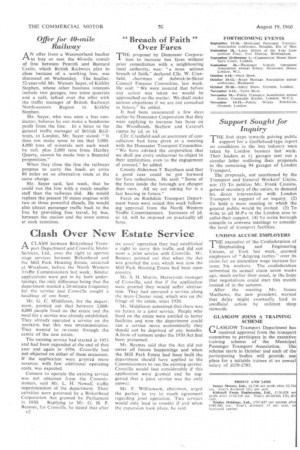Clash Over New Estate Service
Page 38

If you've noticed an error in this article please click here to report it so we can fix it.
A CLASH between Birkenhead Trans
port Department and Crosville Motor Services, Ltd., over the right to operate stage services between Birkenhead and the Mill Park Housing Estate, occurred at Wrexham, before the North Western Traffic Commissioners last week. Similar applications were put in by both undertakings, the only difference being that the department wanted a 24-minute frequency for the service and Crosville sought a headway of one hour.
Mr. G. C. Middleton, for the department, pointed out that between 3,0004,000 people lived on the estate and the need for a service was already established. They already operated a service on the outskirts but this was unremunerative. They wanted to re-route through the centre of the new estate.
The existing service had started in 1953 and had been expanded at the end of that year and again in 1956. Crosville had not objected on either of these occasions. If the application were granted more revenue, with few additional operating costs, was expected.
Consent to operate the existing service was not obtained from the Commissioners, said Mr. L. H. Newall, traffic superintendent of the department. Their activities were governed by a Birkenhead Corporation Act granted by Parliament in 1930. Replying to Mr. G. if P. Beames, for Crosville, he stated that after c2 six years' operation they had established a right to carry this traffic and did not want a joint service with Crosville. Mr. Beames pointed out that when the Act was granted the area which was now the Mill Park Housing Estate had been open country.
Mr. S. I-1, Morris, Merseyside manager of Crosville, said that if the application were granted they would suffer abstraction. They had operated a service along the main Chester road, which was on the fringe of the estate, since 1920.
Mr. Middleton submitted that there was no future in a joint service. People who lived on the estate were entitled to better facilities and now the department could run a service more economically they should not be deprived of any benefits. A form of consent under the 1930 Act had been presumed.
Mr. Beanies said that the Act did not cover all future happenings and when the Mill Park Estate had been built the department should have applied to the Commissioners to run the existing service. Crosville would lose considerably if this application were granted •and he suggested that a joint service was the only answer.
Mr. F. Williamson, chairman, urged the parties to try to reach agreement regarding joint operation. Two services would only lead to trouble if and when the expansion took place, he said.
































































































